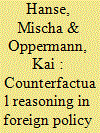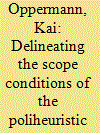| Srl | Item |
| 1 |
ID:
145099


|
|
|
|
|
| Summary/Abstract |
The abstention of the conservative-liberal government under Chancellor Angela Merkel on UN Security Council resolution 1973 marked the first occasion in which the Federal Republic of Germany stood against all three of its main Western partners, the US, France, and the UK, simultaneously, on a major foreign policy issue. Many accounts of this decision invoke the influence of electoral incentives. What is problematic, however, is that the causal weight attached to electoral politics is often left ambiguous and difficult to assess with traditional case study methods. The article, therefore, employs counterfactual reasoning to scrutinize “electoral politics” explanations of Germany's policy on Libya. Specifically, it develops counterfactuals in which decision making did not take place in the shadow of upcoming elections and investigates how other variables on different levels of analysis would have shaped decision making in the counterfactual scenarios. The findings suggest that electoral incentives did not decisively shift German foreign policy on Libya. More generally, the article speaks to the value of counterfactuals in foreign policy analysis.
|
|
|
|
|
|
|
|
|
|
|
|
|
|
|
|
| 2 |
ID:
131054


|
|
|
|
|
| Publication |
2014.
|
| Summary/Abstract |
The poliheuristic theory of foreign policy decision making would benefit from being clearer in spelling out the conditions under which it holds more or less analytic promise. The article makes the case that the concept of issue salience can help the theory address its shortcomings in this respect. In particular, the explanatory power of poliheuristic theory's two-stage model largely depends on the noncompensatory principle of major domestic political loss avoidance on the first stage of the model to simplify the choice set to be considered on the second stage. This is more likely to happen, however, in the case of issues that are highly salient to a government's selectorate than in the case of issues that are of low salience in the domestic arena. The poliheuristic theory should thus be more powerful if it is applied to domestic high-salience rather than low-salience decisions. These theoretical contentions are illustrated in a case study on the decision making of the British Labour government under Tony Blair in the fields of European security and defense policy and the single European currency.
|
|
|
|
|
|
|
|
|
|
|
|
|
|
|
|
| 3 |
ID:
167583


|
|
|
|
|
| Summary/Abstract |
In view of Turkey’s increasing distance from the European Union (EU), the continued partial alignment with EU standards is often attributed either to domestic factors, or to diffusion processes induced by external actors other than the EU. Against this background, in this special issue, we explore the extent to which reforms in Turkey’s environment and energy policy are (still) influenced by the EU. This introduction briefly reviews the Turkey related Europeanisation literature and previews the articles in this special issue.
|
|
|
|
|
|
|
|
|
|
|
|
|
|
|
|
| 4 |
ID:
164407


|
|
|
|
|
| Summary/Abstract |
This article suggests studying special relationships in international politics from an ontological security perspective. It argues that conceptualising the partners to special relationships as ontological security seekers provides a promising theoretical angle to address gaps in our understanding of three important dimensions of such relations: their emergence and stability; the processes and practices of maintaining them; and the power relations within special relations. The article illustrates its theoretical argument in a case study on the German-Israeli relationship. The close partnership between the two countries that has developed since the Holocaust ranks as one of the most remarkable examples of special relationships in the international arena. We argue that foregrounding the ontological security that the special relationship provides, in particular for Germany, sheds important new light on how German-Israeli relations have developed. Specifically, we hold that Germany’s ontological security needs were already an important driver in establishing the relationship and have been a key stabiliser of it ever since; that the ontological security perspective can make sense of three interrelated practices of maintaining the ‘specialness’ of the relationship; and that the asymmetries between the ontological security needs of the two partners help account for Israel’s political leverage in the relationship.
|
|
|
|
|
|
|
|
|
|
|
|
|
|
|
|
| 5 |
ID:
081489


|
|
|
|
|
| Publication |
2008.
|
| Summary/Abstract |
The two-level approach is often criticized for its failure to provide thorough theoretical guidance to the empirical task of establishing the boundaries of governmental win-sets. Addressing this deficit, the article builds upon principal-agent theory to deduce two determinants of win-sets: the salience of a foreign policy issue for a government's domestic principals and the credibility of these principals' threats to sanction their governmental agent for its policy on this issue. To illustrate the analytic utility of the framework, the article puts forward a case study on British European policy under the Blair government. It is argued that the major patterns of New Labour's policy on Europe can be accounted for by shifts in the domestic salience of the European issue and in the ability of principals to credibly sanction their agent's European policy making
|
|
|
|
|
|
|
|
|
|
|
|
|
|
|
|
| 6 |
ID:
119672


|
|
|
|
|
| Publication |
2013.
|
| Summary/Abstract |
The article brings together two cognitive approaches to the analysis of foreign policy: salience and metaphor analysis. Issue salience and metaphors relate to cognitive heuristics that speak to different aspects of the cognitive representation of foreign policy problems which complement each other: the concept of salience looks at the priming of issues in the foreign policymaking environment; metaphors relate to the framing of these issues. The article shows how both cognitive concepts can help the other address individual blind spots. While analyzing the salience of foreign policy issues tells us what issues actors attend to, metaphor analysis can shed light on how they frame these issues and indicate what policy options are made possible. At the same time, salience can help metaphor analysis identify why certain metaphors resonate better in public discourse than others. To briefly illustrate the potential of thinking salience and metaphor analysis together, the article looks into the British public debate about international terrorism and the "war on terror".
|
|
|
|
|
|
|
|
|
|
|
|
|
|
|
|